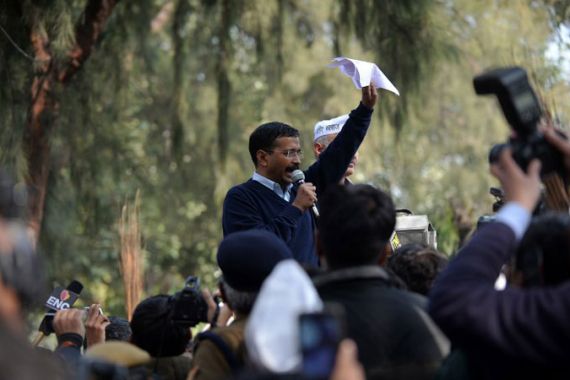Analysis: AAP walks uncharted path
Unprecedented protest by Delhi ministers is something India has never seen before, with jury out on how it will end.

After causing a sensation with its performance in the Delhi state elections, the Aam Aadmi (Common Man) Party-led government’s street protest is taking Indian democracy on an uncharted path.
As chief minister of a state, AAP leader Arvind Kejriwal is a powerful individual and under Indian parliamentary democracy his hold over the government is virtually unquestioned.
That he and his ministerial colleagues have resorted to protest-activism on the streets of the capital New Delhi is holding the nation in thrall since such a spectacle has never been witnessed before since the country’s independence 66 years ago.
They are protesting against a system, unique to Delhi, where the police are under the control of the federal government. Kejriwal’s argument is that when a crime occurs in Delhi, people criticise the state government, not the federal government. So, the police must obey orders of the state, not the centre.
While state governments in the past have protested against various laws and systems imposed by New Delhi, chief ministers have registered their opposition at meetings, discussions and at most by moving resolutions in state assemblies against the federal government.
For the last several years now, it has become almost routine for Indian elected representatives to block the functioning of legislatures and the parliament in protest against some issue or the other. This has resulted in the hold up of several key laws and amendments that needed enactment.
Usual mode of protests
Critics have pointed out that it is convenient for political parties to stage protests within the air-conditioned confines of legislatures and parliament where wide media coverage too is guaranteed. Many have exhorted the protesters to go out into the rough and tumble of the street and make their displeasure known.
The AAP has taken such a course literally. For the first time, a democratically-elected state government has crossed all previous lines and conventions to stage a street protest resulting in a scramble among other political parties, the media, lawmakers and the bureaucracy trying to make sense of the Kejriwal-led action.
The immediate demand of the protesters is the suspension of several police officers, two of whom are being targeted for defying the orders of AAP ministers. The third is being targeted as one accountable for the gang-rape of the Danish girl as it happened in an area under his jurisdiction.
The AAP government, since its taking over office, less than a month ago has displayed an intriguing disdain for power. Kejriwal has repeatedly gone on record saying his party never asked for the support of the Congress. It was the Congress that offered support suo motu, with the help of which the AAP could form government.
If the protests continue, it could lead to a situation where the Congress could well withdraw support leading to the fall of the government. But the AAP does not seem to care.
The media, which over the last few days, seemed to have gone from being an AAP supporter to that of a critic has given time and space for detractors who have questioned the tactics of the fledgling government.
Parties like the Bharatiya Janata Party and the Congress which feared that the AAP could spoil their chances in the national elections a few months away must be hoping that that the street protests will backfire on Kejriwal.
After the unbelievable performance, the AAP government went full steam to announce 666 litres of free water to all households in Delhi, cut power tariff by half, pared down security to ministers and officials and announced an anti-corruption hotline that people could use to trap corrupt officials.
Mixed reactions
While all these appeared to have gone well with people at large, the demand that the police raid without warrant a house inhabited by Ugandan nationals on suspicion of running a drug and prostitution racket has evoked mixed reactions.
AAP leader Yogendra Yadav has gone out of his way to assuage African nationals in Delhi that it was not a racist move, targeting them. But state law minister Somnath Bharti insists that the police should have followed his diktat, even without a warrant. Kejriwal has backed Bharti.
The AAP, still in its nascent stage as a political party, does not appear to have a clear cut agenda. This could either be an advantage or sound its death knell. In addition, the amorphous nature of the party, which consists of people from all sides of the political spectrum, has given rise to a certain confusion as to where exactly the AAP is heading.
The question, in the current context, is where is the protest leading to especially if the federal government does not give in to the demand of the AAP to suspend the police officers. With India’s Republic day on January 26 round the corner and the protesters abutting the area where the military parade is to take place, something or someone is bound to give in sooner than later.